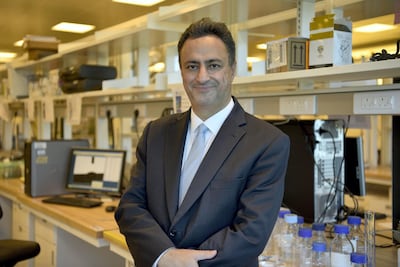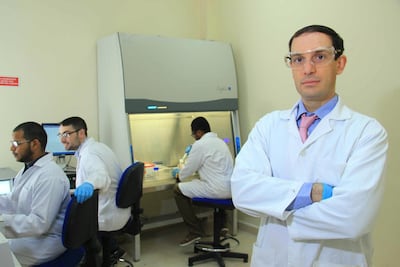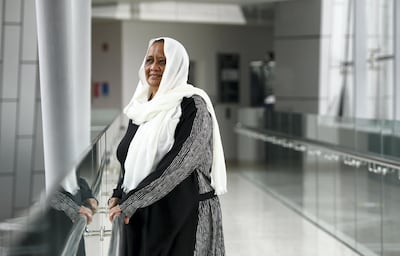Academics granted long-term residency two years ago say the sense of security has immensely benefited their work.
Expatriate professors, who work at universities across the UAE, said they never expected the years they spent hunched inside laboratories, conducting exhaustive research, would see them hand-picked for the 10-year golden visa.
A citizenship programme announced by Sheikh Mohammed bin Rashid, Vice President and Ruler of Dubai, in January has triggered renewed excitement in university circles.
The initiative seeks to grant Emirati citizenship to "talented and innovative" people and, for the first time, allows non-Emiratis to retain their original citizenship.
Senior academics said a shot at citizenship would strengthen contributions to the country’s grand scientific vision and encourage involvement in policy initiatives.
The National spoke to three professors, who were among the first group of 20 selected for permanent visas in 2019. They said the residency visas changed their lives and allowed them to contribute to the country they call home.
The golden visa scheme recognised the exceptional work of expatriates.
Engrossed in cancer research, water desalination and nutrition projects, the professors aim to place the Emirates on the global map in scientific research.
The professor finding better ways to desalinate seawater
Predicting the next big thing the goal for Hassan Arafat, a professor of chemical engineering at Abu Dhabi’s Khalifa University.
“People in academia are able to foresee what the next generation would be interested in or the next big thing that has potential,” said Prof Arafat, director of the university’s Centre for Membrane and Advanced Water Technology.
“Grand challenges require grand ideas that require longer time to work on and integrated efforts.”
The Jordanian, 47, wants to break the silos that academics work in to build a seamless connection between science and industry.
His research focuses on providing affordable and environmentally friendly desalination solutions.
Prof Arafat is working with researchers to design nanomaterials that reduce the amount of energy and chemicals used in the process.
Input from academics can help government departments better navigate the intricacies of scientific policy, technology transfer and intellectual property laws, he said.

He sees permanent residency as a clear signal to “work on something that would be a major development”.
Prof Arafat and his family each received the visa, allowing them to plan a long-term future in the UAE. His daughter, 23, also works in Abu Dhabi, after completing university and his three younger children intend to complete high school and college in the Emirates.
He said the UAE's approach to foster human capital was similar to what could be seen abroad.
“Canada, the US, European countries, Australia have a path to citizenship where people with artistic or scientific talent are given opportunities to become members of the country,” he said.
“The UAE has opened this door to allow people of talent to join the ranks of the UAE citizen.”
The professor trying to reduce the side effects of chemotherapy
Ghaleb Husseini, 45, is working on nanocarriers or microscopic capsules that will transport chemotherapy directly into a cancerous tumour so a patient does not suffer lingering side effects.
The professor of chemical engineering at the American University of Sharjah and his team are currently testing the research on mice.
If it succeeds, he will approach pharmaceutical companies and move to stage-three human trials.

Prof Husseini's objective is to avert adverse reactions from chemotherapy, such as lowered immunity, nausea and vomiting.
“The chemotherapy will not interact with healthy cells because it's inside this nanoparticle and you release it only to the tumour,” said the Palestinian.
He was among a small group of scientists who stood on a stage with Sheikh Mohammed last year to be awarded a golden visa.
Prof Husseini said he and his peers feel confident to take on several research projects owing to the permanence promised by the 10-year visa.
“I felt a little bit more empowered, because I feel I’m here for the long haul.
“It kind of gives you ownership of what you do. You feel that whatever you do in the lab is going to be translated to help the UAE, which is your country.”
The citizenship announcement would usher in a new wave of growth in the medical and scientific fields, he said.
People would be inspired to make “innovative products that the whole world can use and this will sustain the economy".
His ties to the UAE run deep and his three young children view the Emirates as their home.
“I believe the heart of the UAE is young,” Prof Husseini said.
“There is nothing impossible; you can do everything here. This is what I love. I live off this energy.”
The professor who hopes to take camel's milk global
Prof Afaf Kamal Eldin plans to retire in the UAE instead of Sweden, where she lived and worked for more than 20 years.
“For the rest of my life, I can stay here. I would work to the last minute of my ability,” said the Swedish citizen, a professor of food science at the United Arab Emirates University in Al Ain.
“Sweden will still be our country; we will go there for holidays.”

The 10-year golden visa laid to rest any concerns about how long she would stay in the Emirates.
She feels fortunate to be raising her 17-year-old daughter in the UAE, where she can experience a culture similar to her native country of Sudan, where she was born.
Her daughter is now looking to study at a university in the UAE.
“Sweden is now not the only option for us,” said Prof Eldin, who holds dual Swedish and Sudanese citizenship.
“When I retire, do I go back to Sweden? This question was on my mind without an answer.
“But now I can spend the rest of my life in the UAE and continue my mission with a purpose. It will be directed to camel's milk, dates research and development.”
The 59-year-old professor tracks nutritional components in dates and camel's milk.
Her ambition is to revolutionise food products and develop new items by working with industry to attract global attention.
Prof Eldin is exploring adding date fibre to bread to improve nourishment and studying the anti-diabetic properties of camel's milk.
The government’s new citizenship plan for scientists and doctors will help the country take giant steps in the knowledge sector.
“This country is young but moving very fast towards being well-recognised in terms of knowledge. There is need for a coherent task force of people who will dedicate their time in this direction,” she said.








